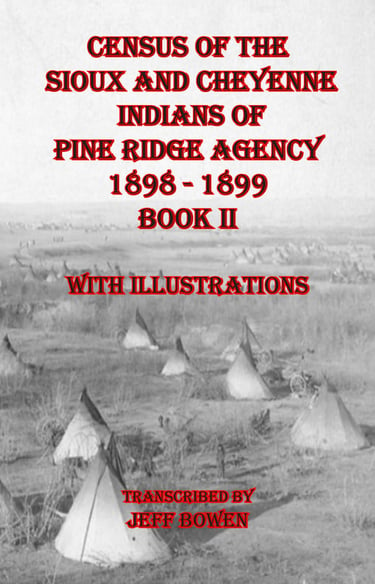Census Of The Sioux And Cheyenne Indians
Of Pine Ridge Agency, S.D.
1898-1899
With Illustrations
Book II
Jeff Bowen


Purchase From:
Amazon US
Barnes & Noble US
Books A Million US
Vroman's Bookstore US
Blackwell's UK
Fishpond AU
Indigo CA
For Libraries and Retailers Click below
ipage.ingramcontent
This census concerns six districts (Wakpamini, White Clay, Porcupine, Wounded Knee, Medicine Root and Pass Creek) of the Pine Ridge Agency, South Dakota, formally known as the Red Cloud Agency, 1896 to 1899 for both the Sioux and Cheyenne. Both tribes knew turmoil together as most people today couldn’t imagine. They’d lost their freedom, their land, the buffalo and a way of life. Eighteen years previous, a courageous Cheyenne Chief, Dull Knife, walked 65 miles in sub-zero weather to Pine Ridge with his wife and small son. With only three blankets among them and what they could carry, his fight to care for his family was all that mattered. Knowing some of his family were gone forever he held on to his integrity and stayed the course. After escaping Fort Robinson, Nebraska late at night, what was to follow during a running fight to defend themselves the Cheyenne suffered heavy losses. Army officers in charge were refusing to give them wood for heat and food to sustain their strength so they’d break down and agree to be moved once again to Oklahoma where many women and children had died from either disease or starvation because of the inefficacy of the appointed agents' promises to provide food and medical care.
Many followers would eventually end up at Pine Ridge by Dull Knife's side, being allies many times and having strong relations with the Sioux; the Northern Cheyenne women would marry Oglala men, Oglala women would marry Northern Cheyenne men, as author Joe Starita so eloquently mentions in the pages of his family's history. The Cheyenne and Sioux were closely related; fought the same enemies, adopted many of the same customs, dress and rituals. They traveled together, hunted the same lands and wintered together in the same mountains. The Black Hills were sacred to both of these people being the land of their vision quests.
At least 20,000 entries between Books I and II with Introduction, a few illustrations, full index in both books containing both Indian and English names, relation, sex, age and roll number.
ISBN: 978-1-64968-121-8
526 pages, paper
Other volumes in this series:
Book I
